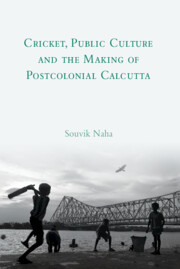Book contents
- Frontmatter
- Dedication
- Contents
- Acknowledgements
- List of Abbreviations
- Introduction
- 1 Cricket, Syndicated Englishness and Postcolonialism
- 2 Narratives of Cricket and Collective History
- 3 The Making of a City of Cricket
- 4 Politicians, Patronage and Centre–State Relations
- 5 Spectators, Gender and Public Space
- 6 The Moral Economy of Violent ‘Gentlemen’
- Conclusion
- Select Bibliography
- Index
1 - Cricket, Syndicated Englishness and Postcolonialism
Published online by Cambridge University Press: 23 November 2022
- Frontmatter
- Dedication
- Contents
- Acknowledgements
- List of Abbreviations
- Introduction
- 1 Cricket, Syndicated Englishness and Postcolonialism
- 2 Narratives of Cricket and Collective History
- 3 The Making of a City of Cricket
- 4 Politicians, Patronage and Centre–State Relations
- 5 Spectators, Gender and Public Space
- 6 The Moral Economy of Violent ‘Gentlemen’
- Conclusion
- Select Bibliography
- Index
Summary
What was wrong with cricket? On a Sunday morning sometime in 1960, this was discussed among a group of friends in a house on Khurut Road in Howrah, a town across the river Ganges from Calcutta. Three professors, two authors, two clerks, one schoolteacher, one lawyer, one businessman, one government officer and one engineer, aged from 20 to 45, vociferously debated if cricket was really worth its popularity. In the opinion of Sankar, a popular author in Bengali, cricket was an ‘illegitimate, immoral, ill-conceived, illogical’ English pursuit. The sight of 2 batsmen dominating 11 fielders reflected an obscene bureaucracy, and 11 fielders closing in on 2 batsmen resembled a slaughter. Cricket was a dreadful remnant of the British rule in India. Sibnarayan Ray, a Marxist philosopher who taught at Calcutta University and was friends with Bertrand Russell, said that no progressive country in the world played cricket. He cited the examples of several countries that were not interested in cricket – Germany, the land of the greatest scientists and philosophers; France, the leader of pursuits of intellect and luxury; Russia, the rebellious redeemer of humanity; America, the champion of fast and consumerist living; and China, full of diligent, ‘yellow-skinned’ people. The critics declared that cricket was merely a passive recreation for people of wealth and leisure, and cricket’s cultural Englishness was deeply problematic for the postcolonial nation. At this point, Sankariprasad Basu, a professor of Bengali at Calcutta University, launched a long polemic in cricket’s favour. Basu made an a priori assumption that while the lack of faults was an admirable quality for a country, the absence of a certain excellence was not a merit or something to be praised. England was no less civilised or developed than the nations Ray had mentioned. Among the virtues to have contributed to England’s rise to power were parliamentary democracy, drama and cricket. It was shameful, Basu concluded, that other so-called developed countries did not play cricket.
Sports followers can sometimes dislike aspects of the game, such as commercialism, but the sports press often marginalises such contradictions in the mythic quest for building an overwhelmingly popular image for the sport. Historians of sport have also often overlooked critical responses to sport, and failed to offer a balanced perspective of sport’s reception in society.
- Type
- Chapter
- Information
- Publisher: Cambridge University PressPrint publication year: 2023



